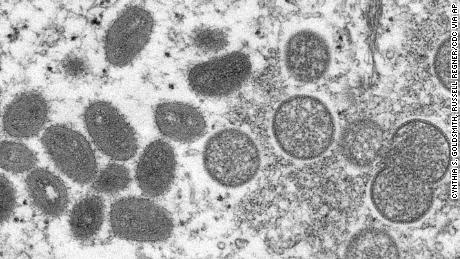Currently, the CDC is monitoring six people in the United States for possible monkeypox infections after they sat near an infected traveler who had symptoms while on a flight from Nigeria to the United Kingdom in early May.
Separately, CDC officials also are investigating a case of monkeypox confirmed in a man in Massachusetts who had recently traveled to Canada. And the New York City Health Department is investigating a possible infection in a patient currently at Bellevue Hospital.
“The Health Department’s Public Health Lab will conduct preliminary tests, which — if positive — will be sent to the U.S. Centers for Disease Control and Prevention for confirmatory testing,”
the department said in a press release on Thursday.
Meanwhile, recent monkeypox infections have been identified in several other regions around the world where the virus is not usually common, including Canada, Great Britain, Italy, Northern Ireland and Spain.
“We have a level of scientific concern about what we’re seeing because this is a very unusual situation. Monkeypox is normally only reported in West Africa or Central Africa, and we don’t see it in the United States or in Europe — and the number of cases that are being reported is definitely outside the level of normal for what we would see,”
Jennifer McQuiston, deputy director of the Division of High Consequence Pathogens and Pathology within the CDC’s National Center for Emerging and Zoonotic Infectious Diseases, told CNN on Thursday.
“At the same time, there really aren’t that many cases that are being reported — I think maybe a dozen, a couple dozen — so, the general public should not be concerned that they are at immediate risk for monkeypox,” she said. “We’re working through the investigations.”
Overall, “we have people who are being monitored for diseases all the time,” CDC spokesperson Christine Pearson wrote in an email, Thursday. That means that if someone might have been exposed to a pathogen, their health is monitored, and they should see physicians if they develop symptoms.
As for the six people currently being monitored for potential monkeypox, they all “are healthy, with no symptoms and are considered at low risk for monkeypox,” Pearson wrote, adding that none were seated next to the ill passenger and none had direct contact.
As the CDC’s investigation continues, discussions have started to include the topic of vaccines.
CDC ‘discussing and evaluating’ smallpox vaccine
CDC officials are evaluating whether smallpox vaccine should be offered to healthcare workers treating monkeypox patients and other people who may be at “high risk” for exposure to monkeypox, McQuiston said.
“It’s definitely something that we’re discussing and evaluating, whether offering smallpox vaccine makes sense in the current setting,” she said. “We’ll be closer to making recommendations for that in the next day or so.”
The variola virus that causes smallpox and the monkeypox virus are somewhat related as they are
both members of the Orthopoxvirus genus, belonging to the scientific family of “pox” viruses. Therefore, some of the same
vaccines administered to prevent smallpox have also been shown to prevent monkeypox. Even though the viruses are related, monkeypox is less contagious than smallpox and causes less severe disease.
‘);$vidEndSlate.removeClass(‘video__end-slate–inactive’).addClass(‘video__end-slate–active’);}};CNN.autoPlayVideoExist = (CNN.autoPlayVideoExist === true) ? true : false;var configObj = {thumb: ‘none’,video: ‘video-landing/2015/02/10/how-vaccines-work-measles-mumps-rubella-mmr-elizabeth-cohen-orig-cfb.cnn’,width: ‘100%’,height: ‘100%’,section: ‘domestic’,profile: ‘expansion’,network: ‘cnn’,markupId: ‘body-text_22’,theoplayer: {allowNativeFullscreen: true},adsection: ‘const-article-inpage’,frameWidth: ‘100%’,frameHeight: ‘100%’,posterImageOverride: {“mini”:{“width”:220,”type”:”jpg”,”uri”:”//cdn.cnn.com/cnnnext/dam/assets/150210154413-vaccines-2-cfb-small-169.jpg”,”height”:124},”xsmall”:{“width”:307,”type”:”jpg”,”uri”:”//cdn.cnn.com/cnnnext/dam/assets/150210154413-vaccines-2-cfb-medium-plus-169.jpg”,”height”:173},”small”:{“width”:460,”type”:”jpg”,”uri”:”//cdn.cnn.com/cnnnext/dam/assets/150210154413-vaccines-2-cfb-large-169.jpg”,”height”:259},”medium”:{“width”:780,”type”:”jpg”,”uri”:”//cdn.cnn.com/cnnnext/dam/assets/150210154413-vaccines-2-cfb-exlarge-169.jpg”,”height”:438},”large”:{“width”:1100,”type”:”jpg”,”uri”:”//cdn.cnn.com/cnnnext/dam/assets/150210154413-vaccines-2-cfb-super-169.jpg”,”height”:619},”full16x9″:{“width”:1600,”type”:”jpg”,”uri”:”//cdn.cnn.com/cnnnext/dam/assets/150210154413-vaccines-2-cfb-full-169.jpg”,”height”:900},”mini1x1″:{“width”:120,”type”:”jpg”,”uri”:”//cdn.cnn.com/cnnnext/dam/assets/150210154413-vaccines-2-cfb-small-11.jpg”,”height”:120}}},autoStartVideo = false,isVideoReplayClicked = false,callbackObj,containerEl,currentVideoCollection = [],currentVideoCollectionId = ”,isLivePlayer = false,mediaMetadataCallbacks,mobilePinnedView = null,moveToNextTimeout,mutePlayerEnabled = false,nextVideoId = ”,nextVideoUrl = ”,turnOnFlashMessaging = false,videoPinner,videoEndSlateImpl;if (CNN.autoPlayVideoExist === false) {autoStartVideo = false;autoStartVideo = typeof CNN.isLoggedInVideoCheck === ‘function’ ? CNN.isLoggedInVideoCheck(autoStartVideo) : autoStartVideo;if (autoStartVideo === true) {if (turnOnFlashMessaging === true) {autoStartVideo = false;containerEl = jQuery(document.getElementById(configObj.markupId));CNN.VideoPlayer.showFlashSlate(containerEl);} else {CNN.autoPlayVideoExist = true;}}}configObj.autostart = CNN.Features.enableAutoplayBlock ? false : autoStartVideo;CNN.VideoPlayer.setPlayerProperties(configObj.markupId, autoStartVideo, isLivePlayer, isVideoReplayClicked, mutePlayerEnabled);CNN.VideoPlayer.setFirstVideoInCollection(currentVideoCollection, configObj.markupId);videoEndSlateImpl = new CNN.VideoEndSlate(‘body-text_22’);function findNextVideo(currentVideoId) {var i,vidObj;if (currentVideoId && jQuery.isArray(currentVideoCollection) && currentVideoCollection.length > 0) {for (i = 0; i 0) {videoEndSlateImpl.showEndSlateForContainer();if (mobilePinnedView) {mobilePinnedView.disable();}}}}callbackObj = {onPlayerReady: function (containerId) {var playerInstance,containerClassId = ‘#’ + containerId;CNN.VideoPlayer.handleInitialExpandableVideoState(containerId);if (CNN.Features.enableVideoObserver && Modernizr && Modernizr.phone) {CNN.VideoPlayer.observeVideoPlayer(containerId);}CNN.VideoPlayer.handleAdOnCVPVisibilityChange(containerId, CNN.pageVis.isDocumentVisible());if (CNN.Features.enableMobileWebFloatingPlayer &&Modernizr &&(Modernizr.phone || Modernizr.mobile || Modernizr.tablet) &&CNN.VideoPlayer.getLibraryName(containerId) === ‘fave’ &&jQuery(containerClassId).parents(‘.js-pg-rail-tall__head’).length > 0 &&CNN.contentModel.pageType === ‘article’) {playerInstance = FAVE.player.getInstance(containerId);mobilePinnedView = new CNN.MobilePinnedView({element: jQuery(containerClassId),enabled: false,transition: CNN.MobileWebFloatingPlayer.transition,onPin: function () {playerInstance.hideUI();},onUnpin: function () {playerInstance.showUI();},onPlayerClick: function () {if (mobilePinnedView) {playerInstance.enterFullscreen();playerInstance.showUI();}},onDismiss: function() {CNN.Videx.mobile.pinnedPlayer.disable();playerInstance.pause();}});/* Storing pinned view on CNN.Videx.mobile.pinnedPlayer So that all players can see the single pinned player */CNN.Videx = CNN.Videx || {};CNN.Videx.mobile = CNN.Videx.mobile || {};CNN.Videx.mobile.pinnedPlayer = mobilePinnedView;}if (Modernizr && !Modernizr.phone && !Modernizr.mobile && !Modernizr.tablet) {if (jQuery(containerClassId).parents(‘.js-pg-rail-tall__head’).length) {videoPinner = new CNN.VideoPinner(containerClassId);videoPinner.init();} else {CNN.VideoPlayer.hideThumbnail(containerId);}}},onContentEntryLoad: function(containerId, playerId, contentid, isQueue) {CNN.VideoPlayer.showSpinner(containerId);},onContentPause: function (containerId, playerId, videoId, paused) {if (mobilePinnedView) {CNN.VideoPlayer.handleMobilePinnedPlayerStates(containerId, paused);}},onContentMetadata: function (containerId, playerId, metadata, contentId, duration, width, height) {var endSlateLen = jQuery(document.getElementById(containerId)).parent().find(‘.js-video__end-slate’).eq(0).length;CNN.VideoSourceUtils.updateSource(containerId, metadata);if (endSlateLen > 0) {videoEndSlateImpl.fetchAndShowRecommendedVideos(metadata);}},onAdPlay: function (containerId, cvpId, token, mode, id, duration, blockId, adType) {/* Dismissing the pinnedPlayer if another video players plays an Ad */CNN.VideoPlayer.dismissMobilePinnedPlayer(containerId);clearTimeout(moveToNextTimeout);CNN.VideoPlayer.hideSpinner(containerId);if (Modernizr && !Modernizr.phone && !Modernizr.mobile && !Modernizr.tablet) {if (typeof videoPinner !== ‘undefined’ && videoPinner !== null) {videoPinner.setIsPlaying(true);videoPinner.animateDown();}}},onAdPause: function (containerId, playerId, token, mode, id, duration, blockId, adType, instance, isAdPause) {if (mobilePinnedView) {CNN.VideoPlayer.handleMobilePinnedPlayerStates(containerId, isAdPause);}},onTrackingFullscreen: function (containerId, PlayerId, dataObj) {CNN.VideoPlayer.handleFullscreenChange(containerId, dataObj);if (mobilePinnedView &&typeof dataObj === ‘object’ &&FAVE.Utils.os === ‘iOS’ && !dataObj.fullscreen) {jQuery(document).scrollTop(mobilePinnedView.getScrollPosition());playerInstance.hideUI();}},onContentPlay: function (containerId, cvpId, event) {var playerInstance,prevVideoId;if (CNN.companion && typeof CNN.companion.updateCompanionLayout === ‘function’) {CNN.companion.updateCompanionLayout(‘restoreEpicAds’);}clearTimeout(moveToNextTimeout);CNN.VideoPlayer.hideSpinner(containerId);if (Modernizr && !Modernizr.phone && !Modernizr.mobile && !Modernizr.tablet) {if (typeof videoPinner !== ‘undefined’ && videoPinner !== null) {videoPinner.setIsPlaying(true);videoPinner.animateDown();}}},onContentReplayRequest: function (containerId, cvpId, contentId) {if (Modernizr && !Modernizr.phone && !Modernizr.mobile && !Modernizr.tablet) {if (typeof videoPinner !== ‘undefined’ && videoPinner !== null) {videoPinner.setIsPlaying(true);var $endSlate = jQuery(document.getElementById(containerId)).parent().find(‘.js-video__end-slate’).eq(0);if ($endSlate.length > 0) {$endSlate.removeClass(‘video__end-slate–active’).addClass(‘video__end-slate–inactive’);}}}},onContentBegin: function (containerId, cvpId, contentId) {if (mobilePinnedView) {mobilePinnedView.enable();}/* Dismissing the pinnedPlayer if another video players plays a video. */CNN.VideoPlayer.dismissMobilePinnedPlayer(containerId);CNN.VideoPlayer.mutePlayer(containerId);if (CNN.companion && typeof CNN.companion.updateCompanionLayout === ‘function’) {CNN.companion.updateCompanionLayout(‘removeEpicAds’);}CNN.VideoPlayer.hideSpinner(containerId);clearTimeout(moveToNextTimeout);CNN.VideoSourceUtils.clearSource(containerId);jQuery(document).triggerVideoContentStarted();},onContentComplete: function (containerId, cvpId, contentId) {if (CNN.companion && typeof CNN.companion.updateCompanionLayout === ‘function’) {CNN.companion.updateCompanionLayout(‘restoreFreewheel’);}navigateToNextVideo(contentId, containerId);},onContentEnd: function (containerId, cvpId, contentId) {if (Modernizr && !Modernizr.phone && !Modernizr.mobile && !Modernizr.tablet) {if (typeof videoPinner !== ‘undefined’ && videoPinner !== null) {videoPinner.setIsPlaying(false);}}},onCVPVisibilityChange: function (containerId, cvpId, visible) {CNN.VideoPlayer.handleAdOnCVPVisibilityChange(containerId, visible);}};if (typeof configObj.context !== ‘string’ || configObj.context.length 0) {configObj.adsection = window.ssid;}CNN.autoPlayVideoExist = (CNN.autoPlayVideoExist === true) ? true : false;CNN.VideoPlayer.getLibrary(configObj, callbackObj, isLivePlayer);});CNN.INJECTOR.scriptComplete(‘videodemanddust’);
“We have vaccines that are stockpiled and available to be used, and if judged as a way to help manage this outbreak, we have the availability to use them,” McQuiston said.
“I would say that we are in the early days of understanding what is causing this outbreak — and the fact that we’re seeing cases reported in multiple places around the globe suggests that maybe it’s been going on for a couple of weeks,” she said. “As we work to complete our investigations and get our arms around it then hopefully we’ll have much stronger recommendations for folks.”
Monkeypox, a viral disease, is rare in the United States and the virus does not occur naturally in the nation,
according to the CDC. But cases have been identified that were associated with international travel or importing animals from areas where the disease is more common. After the virus jumps from an animal to a human, human-to-human transmission of monkeypox can occur when a person encounters the virus through direct contact to: large respiratory droplets, bodily fluids, or lesions on the skin.
Monkeypox
symptoms can include fever, headache, muscle aches and swollen lymph nodes. A characteristic of the disease is that it can cause
lesions and a rash on the body, including the palms of the hands and the soles of the feet.
“This is not a disease that is going to sweep across the country,” Dr. Daniel Bausch, president of the American Society of Tropical Medicine & Hygiene, told CNN on Thursday.
“From a public health angle, of course, we need to investigate and respond — I think the general population should just be aware of this — but there’s certainly no reason to panic and I think it’s highly, highly, highly unlikely that we will get any sort of large outbreak of this,” he said. “And if you haven’t had contact in Massachusetts and you’re not related to the person who had disease or in that link at all — until we have any other reason to expect or to understand how this disease got into the United States — your risk of getting monkeypox is really low.”
A monkeypox mystery
In Massachusetts, physicians donning the same personal protective equipment they wear for Covid-19 patients have been treating the US monkeypox patient at a special pathogens unit within Massachusetts General Hospital, where he originally was diagnosed.
“They were undergoing a workup related to symptoms and the infectious diseases physician seeing the patient, learning about some of the cases in the United Kingdom, decided that the patient could possibly have monkeypox,” Dr. Erica Shenoy, medical director for the Regional Emerging Special Pathogens Treatment Center and associate chief of the infection control unit at Massachusetts General Hospital, told CNN on Thursday.
“Then we had discussions with our state public health officials. The decision was made that yes, they did meet criteria for testing,” Shenoy said. The patient tested positive.
“I think to the public overall, there really is no clear risk at this point,” Shenoy said. “This is an evolving situation that we’re looking to understand better — why these clusters that have been reported as well in the UK and in Portugal and Spain are happening, and to better understand the epidemiology.”
Both in the
United Kingdom and Canada, health authorities have noted that many of the monkeypox cases were identified in men who have sex with men — but the virus is not typically described as a sexually transmitted infection and investigations into these recent cases continue.
Monkeypox was
first discovered in 1958 when two outbreaks of a pox-like illness were seen in colonies of monkeys that were kept for research, leading to the name “monkeypox,” according to the CDC. The first human case of monkeypox was reported years later in 1970 in the Democratic Republic of Congo, during a time when intense efforts were underway to eliminate smallpox.
In the United States, the
last outbreak of monkeypox recorded was in 2003, when 47 confirmed and probable cases were reported in six states: Illinois, Indiana, Kansas, Missouri, Ohio and Wisconsin. “No instances of monkeypox infection were attributed exclusively to person-to-person contact,” according to CDC.
All of the people infected with monkeypox during that outbreak became ill after having contact with pet prairie dogs, the CDC found. Those pets were housed at an animal vendor’s facilities in Illinois where they may have been infected with the virus. The facilities housed other small mammals imported from Ghana that tested positive for monkeypox virus: two African giant pouched rats, nine dormice and three rope squirrels.
“The prairie dogs got monkeypox from the imported animals and then passed it on to the humans,” Bausch said. “It’s a bit of a misnomer calling it monkeypox. The reservoir for this virus, the natural reservoir in nature is probably certain types of rodents.”
US Surgeon General Dr. Vivek Murthy said Thursday that people should not be worried about monkeypox at this point, but that they should be aware of symptoms and when to reach out for help.
Murthy explained on CNN’s New Day that monkeypox is rare in humans, “but when it does come up, it’s a serious one that we should investigate, and we’ve got to make sure that we understand if and how it is spreading from person to person.”
Symptoms generally are similar to the flu, he told CNN’s John Berman and Erica Hill.
“The good news is we have one confirmed case right now. But we should always be on the lookout for more cases,” he said. “At this time, we don’t want people to worry. At this point, again, these numbers are still small — we want them to be aware of these symptoms and if they have any concerns to reach out to their doctor.”



